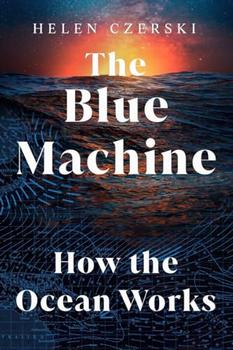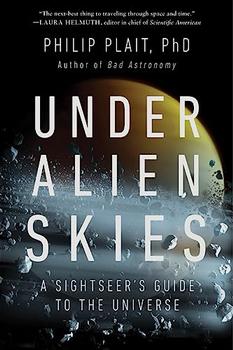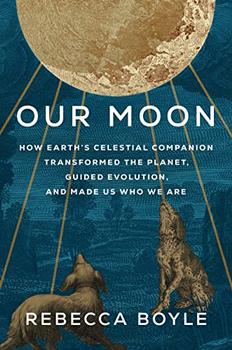Summary | Excerpt | Reviews | Beyond the book | Read-Alikes | Genres & Themes | Author Bio

How the Ocean Works
by Helen CzerskiWe usually think of each of our planet's oceans as separate from the rest, with their own unique characteristics, but in truth they are all part of a single, global system that has a huge impact on all life on Earth. Helen Czerski's fascinating book explains the workings of this complex marine "machine" in a clear, compelling way.
The Blue Machine is separated into three sections. In the first, Czerski explains how the physics of various factors interact to make up the global ocean system. These factors are temperature, salinity, density and spin. Differences in the temperature and salinity of water change the water's density, forming an ocean of distinct layers of water that generally don't mix. The behavior of these layers has a massive impact on oceanic ecosystems, as Czerski demonstrates with the example of an upwelling in the Pacific Ocean off the coast of South America. At this unusual location, winds drive the warm surface water west, away from the coast, which causes cold, nutrient-dense water from the deep to fill the gap. The presence of these nutrients near the surface allows phytoplankton, and therefore the rest of the food chain, to flourish. This small range, which is only about 0.05% of the ocean's surface area, accounts for between 15-20% of our global fish catch.
Similarly, she demonstrates how the earth's spin affects the movement of oceans across the globe. Through the Coriolis Effect, traveling objects not attached to the earth are deflected due to the earth's spin. These objects will take the simplest possible path, but because we are observing from a point that is attached to the spinning earth, it will appear to us as if they are traveling in a curved path rather than a straight one. The moving waters of the ocean are detached enough that this has a major effect on their movement, as the crew of the Norwegian ship the Fram (see Beyond the Book) observed on their expeditions through the Arctic Ocean in the 1890s.
The second section examines how the system outlined in the first part of the book determines the ecosystems that develop within it. Czerski starts by discussing the ways in which light, heat and sound travel through the ocean and how that affects the experience of all three underwater, both for humans and other animals. I found this chapter especially interesting, as she weaves together the underlying physics with the ways animals have evolved to take advantage and people have attempted to do the same through technology. She then dedicates a chapter each to the ocean's "passengers" and "voyagers"—that is, organisms such as plankton that are moved by the ocean's currents, and others such as fish, penguins and even humans, who cross ocean boundaries under their own power.
The final section of the book considers humanity's relationship with the ocean. As Czerski says, her goal in writing the book was to illustrate how the ocean works and why it matters, rather than "pointing accusing fingers at broken things," so this is also the book's shortest section. That does not mean it's any less hard-hitting. She lays out the sheer scope of the environmental problems we are facing, and the types of attitudes that have led to them—the tendency to consider problems solved when they are simply pushed farther away, and to "treat the ocean as an absence rather than a presence." Despite the grim statistics, she ends on a hopeful note, encouraging readers to appreciate our place within this global system.
It's an ambitious book, breaking an incredibly complex global "machine" into parts that the layperson can grasp. Czerski uses a wide variety of examples to illustrate her points and relate the science back to ideas more familiar to readers. While this demonstrates just how connected the ocean is to all aspects of life on Earth, the rapid topic shifts sometimes distract from the main ideas she is describing. Unlike many popular ocean science books, the focus is firmly on physics rather than biology—though she discusses ocean life extensively, it is always in terms of how it is shaped by its environment. I would highly recommend this book to readers interested in ocean science, both for its own sake and to give global context to more narrowly focused books on the topic.
![]() This review was originally published in The BookBrowse Review in October 2023, and has been updated for the
October 2024 edition.
Click here to go to this issue.
This review was originally published in The BookBrowse Review in October 2023, and has been updated for the
October 2024 edition.
Click here to go to this issue.

If you liked The Blue Machine, try these:

by Philip Plait
Published 2024
A rip-roaring tour of the cosmos with the Bad Astronomer, bringing you up close and personal with the universe like never before.

by Rebecca Boyle
Published 2024
Our Moon invites us to reexamine our relationship with our closest cosmic companion.
Your guide toexceptional books
BookBrowse seeks out and recommends the best in contemporary fiction and nonfiction—books that not only engage and entertain but also deepen our understanding of ourselves and the world around us.